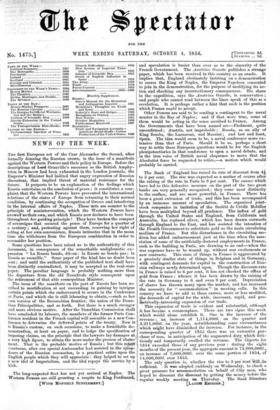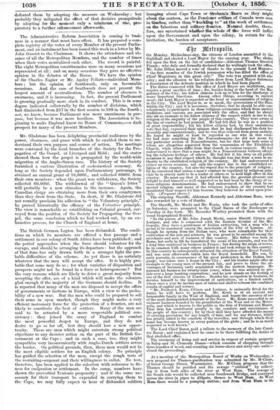The Bank of England has raised its rate of discount
from 41- to 5 per cent. The rise was expected as a matter of course after the raising of the rate in Paris to 6 per cent. The causes which have led to this defensive measure on the part of the two great banks are very generally recognized ; they come most distinctly to the surface, and are most powerful, in France. There has been a great extension of trade, and this has been accompanied by an immense amount of speculation. The organized joint- stock companies in imitation of the Societe de Credit Mobilier have been multiplied beyond all prudence. The influx of gold through the United States and England, from California and Australia, has replaced silver, which has been drawn outwards threugh England to the East, and has assisted the intention of the Pieria. Government to substitute gold as the main circulating medium of France. But this disturbance in the circulating me- dium has added embarrassment just at the time when the asso- ciation of some of the artificially-fostered employments in France, such as the building in Paris, are drawing to an end—when the war expenses have to be wound up, without war excitements or new contracts. This state of things in France is aggravated. by a precisely similar state of things in Belgium and in Germany, with contingent demands for capital in the construction of Rus- sian railways newly determined upon. Though the discount-rate in France is raised to 6 per cent, it has not checked the efflux of gold from France ; whence it has been drawn by the raising of the rate in Germany to 6 and even 9 per cent. Depreciation of shares has thrown many upon the market, and has increased the necessity for "accommodation" in meeting calls. In this country we have to add to these causes, more or less modified, the demands' of capital for the wide, incessant, rapid, and geo- metrically-increasing expansion of our trade.
This expansion of trade is evident and substantial, although it has become a commonplace. There are two signs this week which would alone establish it. One is the increase of the revenue ;, 'an incretuie of 1,114,0001..- on the quarter and 3,211,000/. on the -year, notwithstanding some circumstances which might have diminished the increase. For instance, in the corresponding quarter of 1'855 there was an extensive pur- chase of teas, in anticipation of the augmented duty, which ficti- tiously and temporarily swelled the revenue. The exports for 1854 exceeded those of any previous year : during the eight months of the present year, the aggregate amount is 74,000,000/., an increase of 7,000,0001. over the same portion of 1854, of 14,000,000/. over 1855.
The onlY question is, whether the rise to 5 per cent yrill4nbe sufficient. It was adopted suddenly on Wednesday, to check a great pressure for acoommodation on behalf of -City men, who hoped to discount the discount by getting the money before the regular weekly meeting on Thursday. The Bank Directors defeated them by adopting the measure on Wednesday ; but probably they mitigated the egeet of that decisive promptitude by adopting far the moment only a minimum of rise, va.e- paratory to a further enhancement afterwards.



































